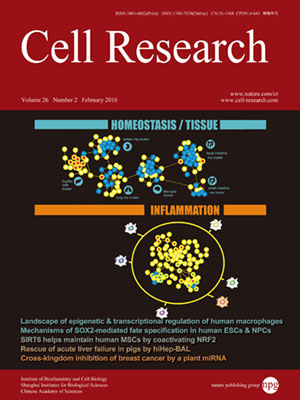
Volume 26, No 2, Feb 2016
ISSN: 1001-0602
EISSN: 1748-7838 2018
impact factor 17.848*
(Clarivate Analytics, 2019)
Volume 26 Issue 2, February 2016: 229-238
ORIGINAL ARTICLES
Mutation of C. elegans demethylase spr-5 extends transgenerational longevity
Eric Lieberman Greer1, Ben Becker3, Christian Latza3, Adam Antebi3,4 and Yang Shi1,2
1Division of Newborn Medicine, Children's Hospital Boston, 300 Longwood Avenue, Boston, MA 02115, USA
2Department of Cell Biology, Harvard Medical School, Boston, MA 02115, USA
3Max Planck Institute for Biology of Ageing, 50931 Cologne, Germany
4Cologne Excellence Cluster on Cellular Stress Responses in Ageing Associated Diseases, University of Cologne, D-50674 Cologne, Germany
Correspondence: Yang Shi, E-mail: yang_shi@hms.harvard.edu; Eric Lieberman Greer,(eric.greer@childrens.harvard.edu)
Complex organismal properties such as longevity can be transmitted across generations by non-genetic factors. Here we demonstrate that deletion of the C. elegans histone H3 lysine 4 dimethyl (H3K4me2) demethylase, spr-5, causes a trans-generational increase in lifespan. We identify a chromatin-modifying network, which regulates this lifespan extension. We further show that this trans-generational lifespan extension is dependent on a hormonal signaling pathway involving the steroid dafachronic acid, an activator of the nuclear receptor DAF-12. These findings suggest that loss of the demethylase SPR-5 causes H3K4me2 mis-regulation and activation of a known lifespan-regulating signaling pathway, leading to trans-generational lifespan extension.
10.1038/cr.2015.148
FULL TEXT | PDF
Browse 1919


